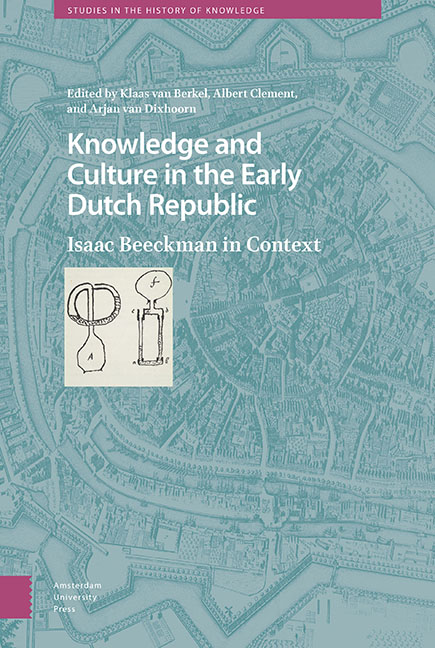9 - Beeckman, Descartes, and the Principle of Conservation of Motion
Published online by Cambridge University Press: 07 October 2022
Summary
Abstract
Historians of science have always affirmed that Descartes owed his principle of conservation of motion to Beeckman. Beeckman adopted this principle in 1613-1614 and Descartes used this principle after meeting him in 1618. In this chapter it is nonetheless argued that Descartes may actually owe it more to Aristotle and the Coimbrans. While neither Aristotle nor the Coimbrans adopted the principle of conservation of motion, they both discussed it repeatedly. And the Coimbrans provided the element which could lead to the adoption of this principle by arguing in their commentary on Aristotle's Physics that motion in a vacuum was possible. Since Descartes studied the Coimbrans at La Fleche in 1612-1613, it is quite possible that he therefore owes the principle of conservation of motion to them.
Keywords: Isaac Beeckman, René Descartes, conservation of motion, principle of inertia, the Coimbrans
Introduction
Isaac Newton (1642/1643-1727) owes his principle of inertia to René Descartes (1596-1650), who owes his principle of conservation of motion (PCM for short) to Isaac Beeckman (1588-1637). Thus, if the importance of Descartes for the history of physics is immense, that of Beeckman is no less significant. But, just as Newton hid his debt to Descartes, so Descartes hid his debt to Beeckman. This is the story of the principle of inertia that is currently being told by historians of science. I intend to show that it is possible to tell another one. This chapter will not look at Newton's debt to Descartes. It will look at Descartes’ debt to Beeckman. Indeed, after having examined the reasons why historians of science currently think that Descartes owes his PCM to Beeckman, I intend to show why Descartes may rather owe it to the Coimbrans, whose commentaries on Aristotle's Physics and On the Heavens – in which the PCM is several times explicitly used – he studied at La Fleche in 1612-1613.
Definition
Before I begin, I would like to make a few remarks concerning the PCM: 1) by PCM, I do not mean the Cartesian principle according to which God conserves the same quantity of motion in the world; 2) by PCM, I do not mean the principle of inertia:
- Type
- Chapter
- Information
- Knowledge and Culture in the Early Dutch RepublicIsaac Beeckman in Context, pp. 201 - 238Publisher: Amsterdam University PressPrint publication year: 2022



